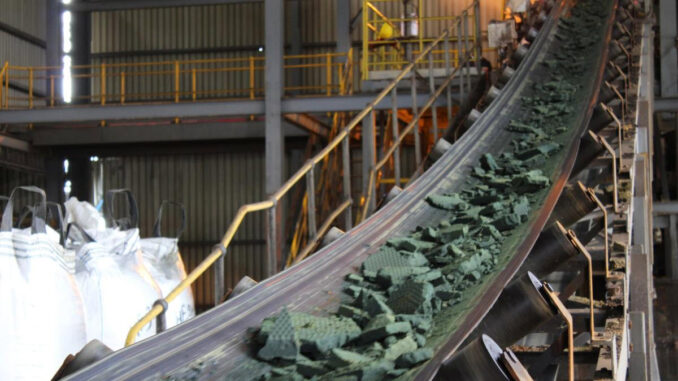
Metals are quickly becoming the new oil as fossil fuels are phased out and replaced with clean energy and electric cars.
The green energy transition relies on mining to produce enough lithium, cobalt, and nickel for the expected boom in solar panels, wind turbines, and electric car batteries over the next decade.
The only problem is that most of those metals are already in short supply. Paltry investments by governments in mining, the complexity of recycling rare metals, and geopolitical trade squabbles are already hampering metal production.
In a recent note to investors, Bank of America analysts warned of a shortage of many critical elements, including rare earth metals that are harder to produce, just as demand is starting to soar.
“Commodity prices have risen, making it more attractive for investors,” Liesbet Grégoir, a metals and mining researcher at Belgian University KU Leuven, told Fortune. “But there is not enough in the pipeline yet. Developing mining projects takes time, and there is a real risk we’re not starting early enough.”
‘A very precarious supply-demand imbalance’
To meet their goals for reducing carbon emissions, countries are depending on the clean energy revolution, which will include huge demand for renewable energy infrastructure and electric vehicles.
The booming interest in electric vehicles over the next decade will see demand for lithium—a crucial metal in EV battery manufacturing—increase 40 times, according to a report last year from The International Energy Agency, a global energy watchdog. Demand for other metals used in batteries and solar panels, like graphite, cobalt, and nickel, is expected to multiply 20 to 25 times current levels.
“Rare earth materials are fundamental building blocks and their applications are very wide across modern life,” Matt Schloustcher, senior vice president of communications and policy at rare earth mining operator MP Minerals, told Fortune. But he added that “one third of the demand in 2035 is not projected to be satisfied based on investments that are happening now.”
MP Minerals operates the Mountain Pass Mine in Nevada, the only rare earth mining and processing facility in the U.S. Around 15% of the world’s rare earth element supply is sourced from Mountain Pass, according to MP Minerals. In February, the facility received $35 million in federal funding to expand its rare earth separating and processing operations.
The global clean energy transition has pushed automakers to make massive investments to electrify their cars, but the industry is set to run into a brick wall sooner rather than later. At current extraction rates, carmakers will need more mining to hit industry forecasts of as many as 300 million electric vehicles on the road worldwide by 2030, as will countries to meet their commitments to achieve net-zero carbon emissions.
Many of the metals that are necessary for the energy transition can only be obtained as byproducts after refining other minerals, an expensive and lengthy project. For instance, tellurium, an important element in certain solar panel manufacturing processes, is primarily a byproduct of copper refining. And as many as nine metals and rare earth elements critical to manufacturing LED lights are byproducts of aluminum, copper, zinc, and lead production.
Unless more investment is redirected towards these processes, the production of byproduct metals will fail to keep up with rising demand.
“That investment in the downstream is not being matched by investment in the upstream,” Schloustcher said. “There’s a very precarious supply-demand imbalance for the critical minerals that are the inputs that enable these technologies.”
Running out of time
With demand from automakers and renewable energy companies expected to surge in the next decade, fixing these upstream supply issues is an immediate concern for mining companies worldwide. But the huge expense of new mining projects, which can require years to set up, are only part of the problem. The other issue is geopolitics.
China controls 80% of the global rare earth metal refining industry. While the U.S. has ramped up its own domestic production targets, China’s dominance means that the West risks being cut out of the supply chain entirely.
Last year, China tightened regulations on rare earth exports to the U.S., and implemented laws that gave Beijing more control over global supply chains. In 2019, the U.S. received 80% of its rare earth minerals from China, while Europe depended on China for 98% of its supply.
“A great many factors influence the potential for shortages,” a U.S. Geological Survey spokesperson told Fortune. “International trade tensions and conflict are well-known reasons, but there are many other possibilities. Disease outbreaks, natural disasters, and even domestic civil strife can affect a country’s mineral industry and its ability to export mineral commodities to the U.S.”
A key factor in stabilizing the metal supply could be recycling, but many experts agree that while technically possible and likely necessary, it is underdeveloped. To recycle lithium, nickel, and cobalt used in electric vehicle batteries, for instance, automakers must either shred and burn dead batteries or dissolve them in acid before extracting the metal. Neither process is very efficient, however, as smelting is energy-intensive and acid baths can corrode and damage the metal.
Research on recycling metals is progressing, and several startups are working on more efficient methods. But progress has been slow, with the Energy Department estimating in 2019 that lithium-ion batteries are collected and recycled at a rate of less than 5%.
“Over the medium- to long-term, recycled or end-of-life metals can become a very valuable source of feedstock that complements the mining of raw material,” Schloustcher said. “But what we’re looking at in the near-term is demand for rare earths basically tripling.”
Through 2050, improved recycling of metals could help supply chains stabilize. But that necessary infrastructure is still a long way off, and experts say the critical time to fix the supply-demand imbalance is now.
“By 2050, we might be okay if recycling efforts kick in,” said KU Leuven’s Grégoir. “But the real challenge is the next decade where recycling can’t play a role yet. There is a serious risk that serious efforts to ramp up clean technologies will be hampered by metal shortages.”
Schloustcher added: “There is not enough material in operation today where a closed loop recycling system, even if everything was 100% recycled, could meet this growing demand. Recycling is very important, but we’re gonna need a lot more mining to meet the demand that most analysts project is on the horizon in the near term.”



